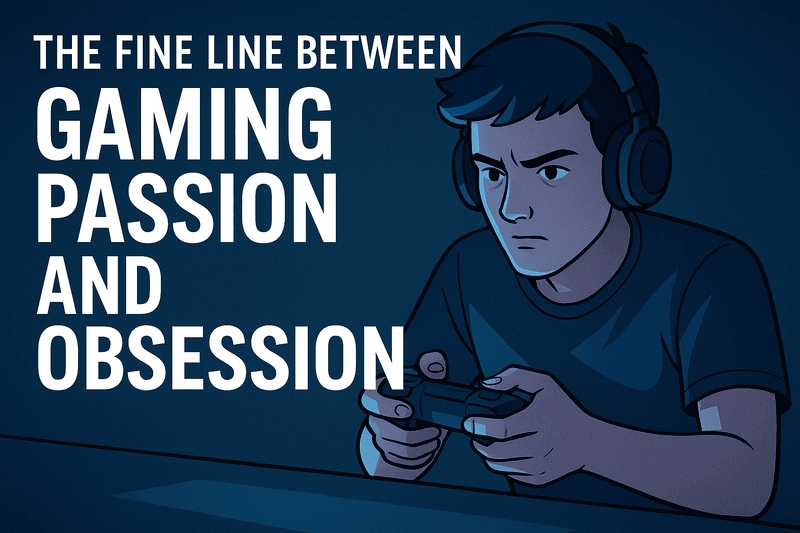Table of Contents
The Fine Line Between Gaming Passion and Obsession
Gaming has come a long way from being just a weekend pastime. For millions, it’s a daily ritual, a social connection, and even a creative outlet. But there’s a thin line between healthy enjoyment and an overwhelming urge to play. As games evolve to become more immersive and reward-focused, many players struggle to recognize when fun turns into fixation.
This article examines how gaming passion can gradually evolve into obsession, how the industry contributes to this shift, and what warning signs to watch for. Understanding that line could help players maintain control and protect what matters in real life.

The Psychology Behind Play
Games are more than entertainment as they trigger emotional and chemical responses in our brains. Leveling up, unlocking rewards, and beating challenges activate dopamine, the brain’s feel-good chemical. While this brings satisfaction, it can also lead to repetitive behavior that mimics addiction.
A study published in the National Library of Medicine involved mothers of 747 children aged 36–72 months. It found a clear connection between the amount of time young kids spend playing digital games and their emotional well-being. On average, children played for nearly 3 hours a day, and those with higher signs of game addiction also showed more depressive symptoms.
The study revealed a strong positive correlation between digital game addiction scores and depressive symptom scores. The study also indicates that game overuse explained 27% of the emotional distress in young children.
This research highlights that even at an early age, children may use games as emotional coping tools. While this can offer temporary comfort, it also shows how quickly digital play can impact mental health when it turns into dependency.
Recognizing the Red Flags in Gaming Behavior
Not all long gaming sessions signal a problem. However, consistent signs, such as skipping meals, ignoring personal hygiene, or neglecting relationships, are early warnings. When gaming takes priority over real-life obligations, an obsession is likely to creep in.
As more children show signs of compulsive play, many parents have begun to recognize the harmful effects of certain game designs. Some are now taking legal action, claiming that their children’s well-being has been compromised by the addictive nature of these games.
With the help of attorneys, families are pursuing the video game addiction lawsuit, which seeks to hold developers accountable for intentionally creating reward systems that can lead to dependency.
According to TorHoerman Law, major companies such as Epic Games, Rockstar Games, and Activision Blizzard are being accused of incorporating addictive mechanics into their games. These include features like loot boxes, progress-based rewards, and instant feedback loops, all designed to keep players engaged for longer and spending more.
How Games Are Built to Keep You Hooked
Modern game design is smart and strategic. Developers know what keeps players coming back. Systems like loot boxes, battle passes, and streak rewards are designed to maximize screen time. The mechanics aren’t random; they’re often grounded in behavioral psychology.
Keeping gamers hooked over time can lead to a range of behavioral and psychological concerns, including poor sleep quality. A systematic review published in ScienceDirect examined 26 studies exploring how video gaming impacts adult sleep. The findings showed that excessive or arousing gameplay, especially before bedtime, was associated with delayed sleep onset, disrupted sleep structure, and lower overall sleep quality.
Interestingly, the review also noted that casual or cognitively stimulating gaming, when done in moderation, had minimal negative effects. In some cases, even improved sleep continuity and daytime function. These results suggest that it’s not just the presence of gaming, but the intensity, duration, and emotional arousal it creates that determines its effect on well-being.
Maybe you would be better if you turn your passion into a career. If you are interested in becoming a game developer you might want to read our article on Are Game Developers in Demand in 2025? Or if you are a passionate gamer then we have the perfect device for you. A gaming optimized Xiaomi flagshup running under HyperOS for the perfect 2025 gaming year.
When Escapism Has Real-World Costs
For many, video games offer a much-needed escape—a way to relax, unwind, or even cope with daily stress. But when that escape becomes constant, it can interfere with important parts of life, like school, sleep, relationships, or emotional health. What starts as harmless downtime can, over time, spiral into dependency.
This growing concern is backed by recent global data. According to the World Health Organization, 34% of adolescents play digital games daily, and 22% spend at least four hours gaming on the days they do. Alarmingly, 12% of adolescents are considered at risk of problematic gaming, with boys more affected than girls.
These numbers point to a bigger picture where long gaming hours reflect deeper issues tied to screen dependence, emotional regulation, and behavioral health. When escape replaces engagement with real life, the consequences can become harder to ignore.
Frequently Asked Questions:
How can you tell if you’re obsessed with gaming or just passionate?
If gaming disrupts your sleep, health, responsibilities, or relationships, it may be more than just passion. Obsession often causes anxiety when not playing, while passion feels balanced. Reflecting on your habits regularly can help you recognize when gaming is becoming unhealthy.
Are all modern games designed to be addictive?
Not all modern games are addictive, but many are designed to encourage longer play. Features like daily rewards, ranking systems, and limited-time events create pressure to keep playing. Being aware of these mechanics helps players make mindful choices and avoid slipping into compulsive behavior.
Can obsessive gaming lead to legal action?
Yes, in certain cases, obsessive gaming has led to legal action. Families have taken steps against developers accused of encouraging addictive behavior in minors. The video game addiction lawsuit highlights growing concern over game design ethics and the responsibility companies have toward younger, more vulnerable players.
Gaming should be fun, not exhausting. While passion is a great thing, unchecked gaming habits can evolve into something harmful. Understanding your relationship with games and recognizing when play becomes pressure can make all the difference. Stay aware, set limits, and keep your gaming life something you love, not something that controls you.
Game Passion Summary: The Fine Line Between Gaming Passion and Obsession

Gaming has evolved into a daily ritual, social outlet, and creative medium, but it can easily shift from passion to obsession. The brain’s dopamine response to achievements, rewards, and challenges makes games highly engaging, sometimes mimicking addiction.
Research shows that even children use games as coping tools, but overuse can harm mental health, leading to depressive symptoms and emotional distress. Warning signs of unhealthy gaming include neglecting meals, hygiene, sleep, and relationships.
Modern games are often designed with addictive mechanics like loot boxes, battle passes, and streak rewards that maximize engagement. These can negatively affect sleep and well-being, though moderate play may have little to no harm. Legal actions against companies like Epic Games, Rockstar, and Activision Blizzard highlight concerns about exploiting players with addictive design.
While games provide escape and stress relief, excessive play can interfere with school, relationships, and health. Data from the WHO shows that 12% of adolescents are at risk of problematic gaming, with boys more vulnerable.
Key Takeaways:
- Passionate gaming is healthy when balanced; obsession disrupts life.
- Addictive design features encourage prolonged play and spending.
- Excessive gaming impacts sleep, emotions, and relationships.
- Families and legal systems are increasingly challenging game companies.
- Self-awareness and setting limits are essential to keeping gaming enjoyable rather than harmful.







